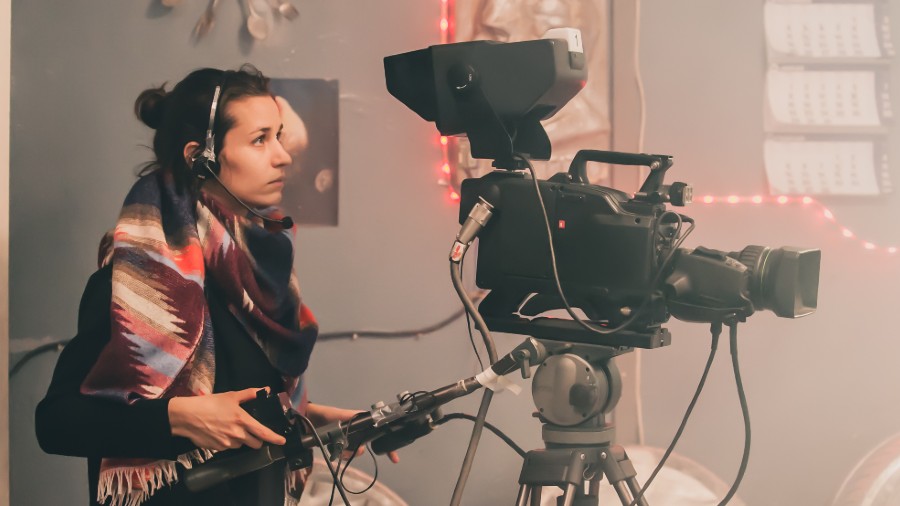Female students training for specialised and technical jobs in the film industry are a worried lot post-Covid-19. Delay in completing their courses, lack of work and internship opportunities and a long-standing prejudice are making them more nervous about the future than their male counterparts.
Sinjini Paul, a 25-year-old third-year student of Satyajit Ray Film and Television Institute (SRFTI), is the only girl in her batch from the cinematography department. “I left a master’s programme at Jamia Millia Islamia University to pursue my dream. Not many girls opt for a career in cinematography as it involves long hours, travel and erratic shifts. Female cinematographers are also not considered good enough,” says Sinjini. She was supposed to get her diploma by August this year and start working in Mumbai soon after. “Third-year students look for work opportunities along with their studies. We lost out on that. I was supposed to assist directors of photography in three feature films. Now all the projects are stalled,” says the student, who feels that the pandemic has just taken competition a few notches higher for women technicians.
“The strength of production teams are being slashed. Fewer assistants are required now. The going will get tougher for freshers in future. There is also a lot of uncertainty around. I have no clue when I will finish my course. However, I have just started getting projects again,” she adds.
Missing out on valuable on-the-job experience is what’s irking most students. “I miss attending workshops that would have helped me interact, network and work with other fellow students. That’s how we learn. Had there been no pandemic, I would have also freelanced regularly for the much-needed exposure,” adds 26-year-old Donna Bose, eyeing a career in production design in feature films. A postgraduate student of fine arts at Visva-Bharati University, she too has no clue when she will complete her degree and start working.
Donna was forced to refuse a few projects that required her to travel during the pandemic. “My parents are above 60 years. I could not risk travelling. I last worked with Ivan Ayr in Meel Patthar back in December-January 2019-20. Since then, I have no classes or projects to show. I am just waiting for things to improve,” she adds.
Like her, most of these students are hoping to resume work by June 2021. Some have also taken up temporary jobs to kill time.
Twenty-five-year-old Neetu Sudha Mohandas of Kerala has been teaching music through online platforms since the lockdown. She is also the only girl in her batch at SRFTI who wants to be a sound recordist. “My diploma is being delayed and so is the post-production work on a documentary that we students were making. I cannot mix sound in a small set-up. I need a studio for that. I am missing out on valuable experience,” says Neetu, who last assisted on an all-women project in Rajasthan in January. “I don’t know when I can travel next for work or who will hire me,” she says.
Ishita Mehta, who dreams of being a film producer, echoes similar sentiments. “I was supposed to assist in a two-country collaboration project that got stalled. Foreign film crews cannot shoot in India for a while. There are tonnes of restrictions and guidelines now that are limiting my opportunities,” says the 26-year-old from Delhi. Like others, she is also playing the waiting game, not sure when she will finally start on her dream career.
Adds Ishita, “A producer, contrary to Bollywood lingo, is not the financier of a film but the overall ideator, facilitator and manager. People often believe that women can’t make good producers as they are not good at jugaad.”
The few who are working from home are just as frustrated. “I like telling stories through animation. I am working on a few projects from home that involve less animation. I don’t have the resources to support very creative work. I wish I had access to a studio,” laments 26-year-old Triparna Maiti, who is training to be an animator.
According to filmmaker Ananya Chakraborti, the going is tough for all. “Very few films are being shot now. Financiers are hard to come by. We have no clue when the cinemas will reopen and when people will start flocking to them again. Just like restaurants are now open but are attracting very few people. Manpower is being slashed. It is a difficult situation for all, especially students and rookies trying out unconventional careers. Technical jobs, such as cinematography, were considered off-bounds for girls till a few years ago. The prejudice is still there. So, the girls have to work that much harder,” said the current chairperson of the West Bengal Commission for Protection of Child Rights.











